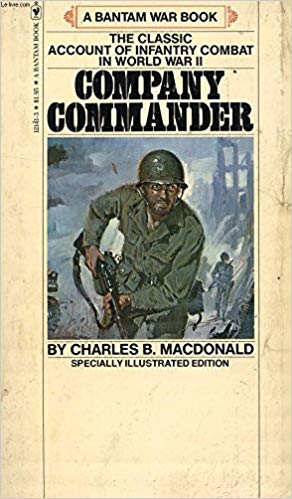
I recently re-read Company Commander by the late Charles B. McDonald. I had read it as a kid and picked up a used copy of it for my son. It was a Bantam War Book, specially illustrated edition. It still had the original price tag from 1979 on it: $2.25. My son never read it, so I decided to earlier this month.
What caught my attention on the re-reading was a passage on pages 212 and 215 that stated:
The buildings on either side of us disrupted the weak platoon radios, and I could not contact Sergeant Patton. We moved forward quickly, calling over the radio as we went, until we established contact. They had run into German machine guns in the last scattered house of the town and were having a stiff fight. I said I would send our light machine guns to help and called for them from the weapons platoon. They hurried up the street toward the sound of the firing.
Battalion radioed a change of orders….
I tried to call the platoons, but I could contact only the 1st and 2d, and Sergeant Patton said he did not know if he could disengage himself from the fire fight.
I told him to get out as quickly as he could, “Then move back to the castle and follow us around to the left. You’ll be the support platoon. If you can’t get away soon, we’ll start on up the hill without you. Just leave the Krauts. F company will take care of them.”
We’ve got three prisoners in the basement of a house,” Patton said, “and we have to cross a hundred yards of open field to get back out. We’ll never make it with the prisoners.”
“Roger,” I answered. “Do what you can.”…[page 212]
[page 215] Sergeant Patton’s platoon arrived, tired and dusty from the tiring uphill walk from Bendorf-Sayn. The prisoners were not with them.
Company G today committed a war crime. They are going to win the war, however, so I don’t suppose it really matters. [This paragraph was in italics in the original]
There is also a brief passage on pages 286 and 288:
Colonel Smith sent a messenger to tell me to meet him at a house in the center of the town….
“I just ran into your boy Junior,” Colonel Smith said. “He’s having a little trouble with a German major who claims he’s in command of all the flak defenses around Merseburg and seems quite put out that your men took him prisoner. He kept begging Junior either to shoot him or let him shoot himself. Junior was about to let him have his way when I happened up.” [page 286]
[page 288] “OK, Mac,” the Colonel answered….”By the way,” he added, “you can tell Junior that we finally had to dispense with his German major. He tried to make a run for it.”
Company Commander appears to be a very honest account. These are certainly uncomfortable passages. He did have the option to leave them out.
I did meet with Charles Macdonald back in the late 1980s. Him and Hugh Cole were consultants to the Ardennes Campaign Simulation Data Base (ACSDB).
I still recall our conversations with him, particularly about the American nurse and German General Fritz Bayerlein at Bastogne, but that is the subject of another post.

Chris, that was a nice tease for your next post:
“I still recall our conversations with him, particularly about the American nurse and German General Fritz Bayerlein at Bastogne, but that is the subject of another post.”